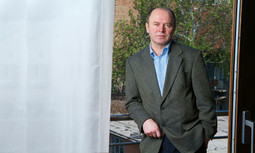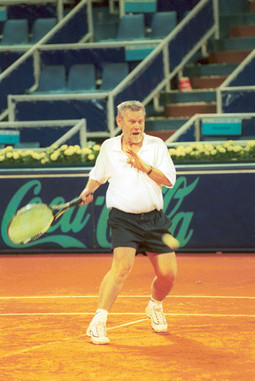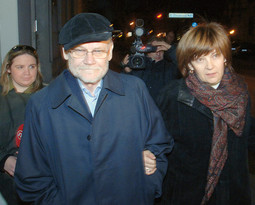Published in Nacional number 597, 2007-04-24
EXCLUSIVE - NIKOLA ČIČAK: SHOULDER EXPERT
'My colleagues have falsely accused me for Racan’s condition'
ORTHOPAEDIC PHYSICIAN NIKOLA ČIČAK, Croatia’s leading shoulder expert, speaks for Nacional about how he has been struck with accusations of being directly responsible for Ivica Racan’s current medical condition
 Dr. CicakNow at the time when the key person of the Croatian Social Democrats, Ivica Racan, is fighting for his life at Zagreb’s Rebro Hospital due to aggressive kidney cancer, the grapevine is reaming with speculations as to whether he was incorrectly treated. Nacional has learned from medical circles that the unofficial conclusion is that an orthopaedic physician in Zagreb treated Racan for three months, without giving the right diagnosis. However, many would admit that Racan’s state was not nearly as dramatic as it is today, and that the doctor in question did his job correctly. In light of these speculations, Nacional has learned that some doctors are pointing the finger at their colleague, Croatia’s leading shoulder expert, Dr. Nikola Cicak from the Orthopaedic Ward at Salata Hospital. In order to investigate these allegations, Nacional insisted on speaking directly with Dr. Cicak, particularly since many doctors believe that even if the cancer had been correctly diagnosed three months ago, little could have been done differently.
Dr. CicakNow at the time when the key person of the Croatian Social Democrats, Ivica Racan, is fighting for his life at Zagreb’s Rebro Hospital due to aggressive kidney cancer, the grapevine is reaming with speculations as to whether he was incorrectly treated. Nacional has learned from medical circles that the unofficial conclusion is that an orthopaedic physician in Zagreb treated Racan for three months, without giving the right diagnosis. However, many would admit that Racan’s state was not nearly as dramatic as it is today, and that the doctor in question did his job correctly. In light of these speculations, Nacional has learned that some doctors are pointing the finger at their colleague, Croatia’s leading shoulder expert, Dr. Nikola Cicak from the Orthopaedic Ward at Salata Hospital. In order to investigate these allegations, Nacional insisted on speaking directly with Dr. Cicak, particularly since many doctors believe that even if the cancer had been correctly diagnosed three months ago, little could have been done differently.
Dr. Cicak reluctantly agreed to give an interview for Nacional due to Racan’s serious condition, but in the end revealed that he did not treat Racan and that he only examined him once.
NACIONAL: It was very difficult to get you to agree to this interview. Why?
- I was very reluctant, not for myself, but for the situation that Ivica Racan, his family and friends are in now. It is still very difficult for me to talk about this topic, both as a doctor and as a person, as I am very sympathetic to Racan and those close to him.
NACIONAL: Why did you agree in the end?
- There are two reasons. The first is the fact that some have accused me of being responsible for Racan’s current medical state and that everything could have unfolded differently had the right diagnosis been made on time. As a doctor, this bothers me, as I could not have significantly impacted Racan’s condition. The second reason is that I am being asked daily by patients in fear, ‘Do I have the same disease as Ivica Racan?’ It is very difficult to explain that this is a very rare condition and that their chances of having something like this exceptionally small. This was an exceptionally rare set of circumstances, a disease that we physicians have come across for the first time, and I think that in this situation, people need to be understanding and accept the fact that we are not all-powerful. I otherwise never would have agreed to this interview, but now I think that it’s necessary, both for our patients and the medical profession, as this truly is a specific situation and a specific case. Due to doctor-patient confidentiality, I can only talk about what the public already knows.
NACIONAL: Did you know Ivica Racan before he came to your office, was he previously a patient of yours?
- No, Racan was not a patient of mine and I did not know him.
NACIONAL: When he came in for the examination, what did he tell you about his health condition?
- Ivica Racan came to me at the Salata Clinic on the afternoon of 29 December 2006. He said that he had been experiencing shoulder pains for more than a month and he mentioned that he had been going to physical therapy. He told me that the pain was incessant, both day and night, and especially when he moved his arm suddenly or tried to grasp something.
NACIONAL: At that time, did he already have a diagnosis, did he mention anything to you?
- No. He only said that he played tennis, but couldn’t remember any injury.
NACIONAL: He didn’t mention or show you any previous medical documents on tests he might have had done earlier?
- No. The only thing he had was an x-ray, which was normal.
NACIONAL: How did the examine go?
- It was a classical exam that I do with all my patients. Other than limited passive and active movements in the right shoulder, I saw no other signs of illness. The pain only appeared in extended shoulder movements. There was no swelling in the shoulder area, including the shoulder blade. It is important to note that there was no lump between the shoulder blade and chest, which can appear in tumours on the inside of the shoulder blade. After the clinical exam, I conducted an ultrasound. This is always a standard method used to examine patients with shoulder disorders and injuries, and which can reveal ruptured tendons, bone surface damage, tumours or infections. The ultrasound showed nothing out of the ordinary. However, it should be noted that ultrasound can only examine the outer parts of the body; all that is deep inside or hidden by bones is out of reach. Also, the x-ray was normal. So, when I saw the ultrasound and x-ray, the clinical exam and Racan’s accounts of pains that had been ongoing for a month, with limited active and passive shoulder movements and no sign of injury, my initial diagnosis was frozen shoulder syndrome.
 Ivica RacanNACIONAL: What kind of a syndrome is this?
Ivica RacanNACIONAL: What kind of a syndrome is this?
- Frozen shoulder syndrome is an illness of the joint, the cause is commonly unknown, though its behaviour is known. It usually affects people between 40 and 65 years of age. Ther are two main symptoms, pain and limitation of movement. The syndrome unfolds in three phases. The first is the most difficult due to the serious pains, and this can last from three to six months. In the first month or two, the pains come on suddenly, and movement is gradually limited as the pain increases. In this phase, it is difficult to tell whether this truly is frozen shoulder syndrome, and so patients must be observed. Doctors are helpless, as no treatment will help the patient. In the second phase, again lasting three to six months, when the shoulder “freezes”, it is possible to be almost certain that this is frozen shoulder syndrome, as it is characterised by limitation of three movements – external rotation, internal rotation and raising the arms above the head. All these movements are limited in this syndrome while in other shoulder illnesses, this is not the case, so at this stage the diagnosis is easy to give. In the third phase, movement returns to the shoulder and the pain subsides.
Upon suspicion of frozen shoulder syndrome, it is standard to set the diagnosis through clinical findings and the patient history, while the x-ray and ultrasound are normal in the first phase. We explain the condition to the patient, and tell them it will pass but could take up to two years. For some patients, it is possible to conduct an operation after six months to return mobility to the shoulder.
NACIONAL: You said that frozen shoulder syndrome was just your initial diagnosis for Ivica Racan. Why?
- That is because the frozen shoulder is a syndrome and not a disease, and can result from numerous other conditions. It can appear due to a ruptured tendon or inflammation in the shoulder, neck pain, diabetes and in thyroid and heart conditions, and in primary and secondary tumours. Considering that this is just a syndrome, this diagnosis is just an initial diagnosis for the first 3-4 months. If a diagnostic cause cannot be found in that period, such as lime in the shoulder, shoulder injury, arthrosis of the shoulder joint, inflammation, tumour or something else, then the cause remains unknown.
NACIONAL: What did you tell Ivica Racan after conducting the examination.
- I explained that according to the clinical exam, this was obviously frozen shoulder syndrome, and that this is the first phase which is very painful. I told him, if at all possible, to avoid opiates and painkillers. I explained that physical therapy will not help, but if it gives any relief, that he can continue. My recommendation was to rest the shoulder.
NACIONAL: Did you book Ivica Racan for a follow-up exam?
- Of course. I booked him for a follow-up in one month, and told him that if anything should happen in the meantime that he could come see me anytime.
NACIONAL: When did you give that second, follow-up exam?
- I didn’t, because Racan never called back.
NACIONAL: During the first exam, did you tell him that this is a syndrome that can warn of the presence of another illness?
- No. I had no reason to mention it, as there was not a single reason why I should suspect a tumour. In my practice, I have had about five patients each week with frozen shoulder syndrome for years, and I have never had a case in which the syndrome was the first manifestation of a tumour.
NACIONAL: How did Ivica Racan react when you said you suspected frozen shoulder syndrome?
- Ivica Racan was very correct. I remember that we were joking around when I recommended that he try to use his left hand to shake hands, and he smiled and said that, as a left-winger, he could do that.
NACIONAL: When you think back now, did you do all the regular tests and exams as an orthopaedic specialist in Racan’s case?
- I did absolutely everything. There was nothing else I could have done in that phase.
NACIONAL: Some medical circles claim that Racan should have been examined using magnetic resonance. Is this a regular test for the type of shoulder pain that Ivica Racan had?
- No. Magnetic resonance is not typically used for that kind of a diagnosis, here or elsewhere. It can be used in the second phase, at the follow-up exam, if it proves that the condition is not improving or it is heading in some other direction. I have treated many, many patients with frozen shoulder, but I have never had to do magnetic resonance, because it can’t help me in making the diagnosis. The pain Racan had at the time of the exam corresponded to frozen shoulder syndrome.
NACIONAL: Did Racan mention to you that he had seen any other doctors, such as an internist?
- He mentioned that he had seen a physiologist.
NACIONAL: After that first exam, were you in any way involved in his treatment?
- We had agreed that he come in again in a month, or sooner. But he never called again. Only then when he was diagnosed with an atypical shoulder tumour was I invited to take a look at the magnetic resonance images and give my opinion on the further course of treatment.
NACIONAL: What did you see?
- On the images, I could see a thickening of the subscapular muscle that lines the inner side of the shoulder blade. Nothing else was visible until the contrast was activated, and then it could be seen that this mass was spreading and then we knew it was a tumour. But no one could tell what kind of a tumour it was until the biopsy was conduced in Munich.
 Ivica Racan and his wife Dijana PlestinaNACIONAL: You say that in your long medical practice, as one of Croatia’s best known shoulder experts, you have never come across such a case in which kidney cancer metastasized in the subscapular muscle. Just how rare is this case?
Ivica Racan and his wife Dijana PlestinaNACIONAL: You say that in your long medical practice, as one of Croatia’s best known shoulder experts, you have never come across such a case in which kidney cancer metastasized in the subscapular muscle. Just how rare is this case?
- I have never seen anything like it in my life and I don’t believe I ever will again. Had I seen a patient with such a condition before, I might have suspected it was possible in Racan. This truly gave no signs that it could be metastasis of some other tumour. In the available literature and on the internet, I have found only four similar cases, but these were primary tumours. All these cases were also initially considered to be frozen shoulder syndrome, and for some it took years to uncover the real diagnosis.
It is exceptionally rare for a cancer to metastasize in muscle. There is mention of only 25 such cases, not only in the shoulder but throughout the body. The literature makes no mention of any cases of metastasis in the subscapular muscle, like in Racan’s case. I found cases of primary and secondary tumours in the shoulder area, that were visible either at the first clinical exam, in the x-ray, ultrasound or magnetic resonance. I have never had a patient with frozen shoulder syndrome that was caused by a tumour.
NACIONAL: Now that Ivica Racan’s true condition is known, do you think that you did all you could in the given situation, seeing a patient for the first time and without any prior medical documentation?
- As both a doctor and a person, I am very sorry that this has happened to Ivica Racan. But my conscience is clear and I think that I did all I could at that time. I even told Racan to come in after one month, even thought the follow-up exam is usually after three months, at the end of the first phase. I would have felt guilty had I examined Racan a second time and didn’t notice anything out of the ordinary.
 Tumour unknown to the world elite
Tumour unknown to the world elite
Dr. Cicak commented on the rarity of Ivica Racan’s diagnosis, saying “At the time we learned of the diagnosis of the tumour in the subscapular muscle in Racan’s case, I was at the Congress of the American Academy of Orthopaedic Surgeons in San Diego. There I met with the world’s leading shoulder experts. Considering that I was surprised by Racan’s diagnosis, I asked my esteemed colleagues whether they had ever seen such a case. Christian Gerber from Switzerland, undoubtedly the world’s top shoulder expert, said that he had not seen anything like that. I was told the same by Dr. Ralph Hertel from Switzerland, Dr. Herbert Resch from Austria, Dr. Joerg Jerosch from Germany and Dr. Lars Neumann from England”.
Related articles
Racan confirms: Ljubo Jurcic to be SDP’s premier candidate
Ljubo Jurcic will be SDP’s candidate for Premier. Definitive confirmation that SDP will most likely receive a new candidate arrived on Tuesday 6… Više
Latest news
-
28.10.2010. / 14:15
'A profitable INA is in everyone's interest'
-
28.10.2010. / 09:38
Sanader’s eight fear SDP — Won’t bring down Government
-
21.10.2010. / 15:02
Interior Ministry turned a blind eye on Pukanic assassination
-
20.10.2010. / 09:34
Barisic could bankrupt HDZ




